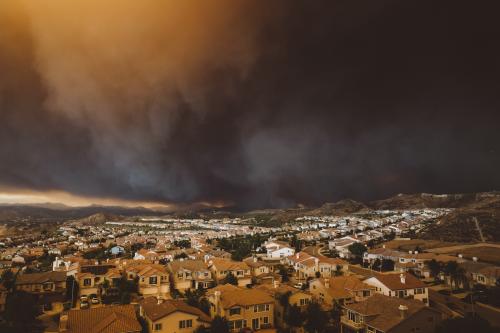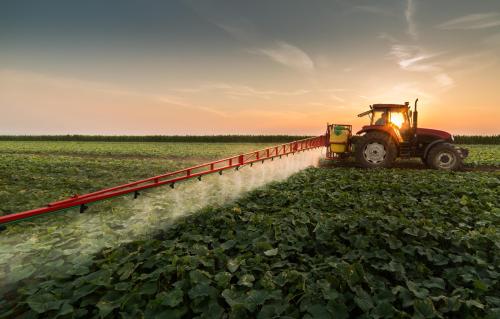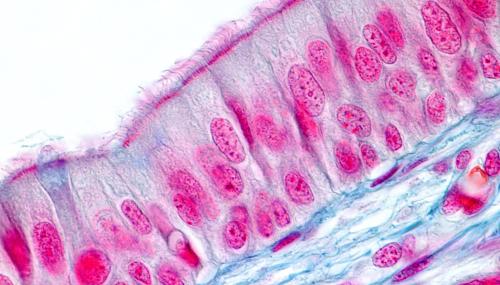Our Pilot Projects Program is one of the main ways we fund environmental health research.
Keith Bein, PhD
Air Quality Research Center
Wildfire toxicology: Fingerprinting toxicological triggers in wildfire emissions

Climate change is driving increases in the size, frequency, duration and severity of wildfires, accompanied by longer fire seasons and larger areas of susceptibility. At the same time, human development is decreasing the boundary between natural and populated areas, making large population centers vulnerable to this destructive force. Although wildfires have been studied for decades, large knowledge gaps still exist in the impact of their emissions when they cross the wildland-urban interface and consume the built environment.
Accompanying these shifting trends is an acceleration in the scale, scope and duration of public exposure to unhealthy levels of air pollution due to wildfire emissions. For example, 22 of the 30 most polluted days in the Bay Area since 1999 have occurred in the last three years due to wildfires, with the latest 2020 siege setting a record of more than 30 consecutive days with an unhealthy level of air pollution. We have been chasing and sampling these events since the ominous 2017 NorCal Firestorm that decimated Napa and Sonoma counties and have amassed a sizeable archive of wildfire pollution samples.
The research being conducted here aims to investigate the composition and toxicity of these samples using a combination of sophisticated analytical chemistry techniques like mass spectrometry and advanced toxicity screening methods like cellular bioassays. In combination, these data will help us search for chemical fingerprints that trigger adverse biological reactions. Results will help inform public health officials, and others, on how best to protect human health during these events.
David Hessl, PhD
Department of Psychiatry and Behavioral Sciences, MIND Institute
Long-term mental health effects of wildfire exposure and resilience in youth: Connections to environmental values and civic engagement

The passionate voices of young people are raising awareness about human-caused changes in the climate and motivating action for change. The youth of today will shape how societies accept, understand and respond to this global problem.
Global warming is no longer a worry about the future – it is an environmental threat to physical and mental health and its effects are being felt here and now. California has been most affected by more frequent and severe wildfires which have taken a toll on the mental health of families and young people. Of course, wildfires cause lots of disruptions and stress in people’s lives when they occur. But in addition, the awareness of global warming raised by these events represents uncertainty and anxiety about the future for young people.
This project studies several questions. First, how is the mental health of young people affected by being exposed to the stresses related to wildfires? Do these effects on mental health continue several years afterward? What kind of supports or characteristics of young people and their families protect them from these mental health effects? Finally, does exposure to climate-related disasters such as wildfires influence the development of attitudes about the environment in young people?
These questions will be studied in families affected to varying degrees by the Northern California wildfires in 2017 and 2018. A unique aspect of this study is that we will be collecting information about mental health directly from youth, rather than relying only on parental reporting.
The project will distribute results that guide families and agencies regarding mental health risks and protective elements, in order to prepare for future fires and other climate-related events. These research and outreach efforts, assisted by the UC Davis Center for Regional Change, will include partnerships with mental health service teams in Sonoma and Butte counties where the fires occurred and the Sunrise Movement (a youth-led organization aiming to stop human-caused global warming).
Dipak Ghosal, PhD | Natalia Deeb-Sossa, PhD
Department of Computer Science | Chicana/o Studies
Say before you spray: Assessing the health and behavioral impact of pesticide use notification

In partnership with Californians for Pesticide Reform (CPR), a statewide coalition with deep ties to the community in Shafter, California, we will work in close consultation with community residents to make notification about agricultural pesticide applications accessible to the public and evaluate the impact of this information on health behavior, understanding and exposure in the target population.
Notices of Intent (NOIs) are highly technical documents and hard for community members to interpret. We propose exploring what information is most needed to protect community members from exposure; how to convert NOIs into usable information in real time; and what medium would be most appropriate for disseminating the information.
We will explore different technologies to provide accurate and timely information to the community. We will work with CPR on a consultation process with Shafter residents and the Shafter Steering Committee to identify dissemination strategies, content and technologies that best provide access to notification information. Working with the Shafter Steering Committee, we will consider different implementation strategies tailored to the unique needs of the community.
At the same time, we will work with trusted local organizers to gather qualitative data on how this knowledge is put to use by participants, such as taking steps to protect their health, advocating for changes to proposed applications, engaging in local and state decision making processes and educating others about risk reduction strategies.
Hong Ji, PhD
Department of Anatomy, Physiology and Cell biology, School of Veterinary Medicine
Epigenetic memory of early life exposure to wildfire and impact on infection

Wildfires are increasingly recognized as an important public health issue and exposure to wildfire smoke has been associated with higher risk of respiratory illnesses. Infants and young children are particularly vulnerable, as their lungs and immune systems are actively developing. Exposure to wildfire smoke during this growth period may have long-term health effects, such as compromised lung function in general and abnormal immune responses to bacterial and viral infection. However, how wildfire smoke exposure during early life causes such long-term defects is not known. Evidence from a pilot study in non-human primates suggest that the epigenome may be an important contributing factor.
This pilot study aims to determine whether the wildfire smoke changes the epigenome of the airways in young children, which change gene expression and function without changing primary DNA sequence. These epigenetic changes can be long-lived in cells and lead to defective lung development and abnormal responses to pathogens later in life.
The results of this study will have direct relevance to our community’s health concerns about wildfire smoke exposures and health outcomes, provide possible explanations for the long-term effects of wildfire smoke exposure in young children and form the basis for designing strategies to mitigate such negative impact.
Jasquelin Peña, PhD
Department of Civil and Environmental Engineering
Impact of wildfire on water resources and human health

The dramatic increase in fire severity and frequency in the Western United States in the last decade makes research on the impact of wildfires on public health an urgent issue in California. Significant effort in research at the intersection of fire impacts and human health has focused on investigating the effect of smoke and particulate matter inhalation. However, less research has focused on understanding the impact of fire on groundwater quality and subsequent exposure to toxic compounds through water.
Groundwater provides 40 – 60 percent of the total state’s water supply, with more than 30 million Californians depending on groundwater resources. A large number of agricultural, rural and disadvantaged communities depend solely on groundwater as a source of water, raising public health and equity concerns. The potential for contaminants to accumulate in water due to direct or indirect fire impacts calls for research at the nexus of fire, groundwater quality and human health.
This pilot project will enable us to collect preliminary data on the impact of wildfire on water resources and implications for human health. We will sample wildfire ash from a number of burned areas with different land use and conduct chemical analysis of inorganic and organic constituents in the ash, including identifying the chemical speciation of inorganic constituents where environmental mobility, bioavailability and toxicity can be dependent on their chemical forms.
This research provides an opportunity to address the understudied but potentially critical human health impact of fire resulting from exposure to degraded water supplies that, unlike hazardous air exposure, may manifest over the medium and long-term.
Contact
If you'd like more information about a particular project, please contact Ruth Williams (ruwilliams@ucdavis.edu) for details.
